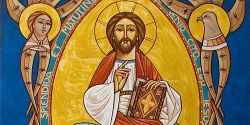Waiting for the Lord
Words of Spirituality
by ENZO BIANCHI
Waiting for the Lord allows us to open our heart outward to encompass and express the longing of all of creation
“As we eat this bread and drink this cup, we proclaim your death, Lord Jesus Christ, until you come in glory.” These words at the heart of the Eucharistic celebration remind Christians of a central aspect of their identity and life of faith: waiting for the coming of the Lord. “The Christian,” wrote Cardinal Newman, “is one who waits for Christ.” Of course, in a society that wants to have everything immediately, that values speed and productivity, and in which even Christians can often be identified by their frenetic activity, anyone who talks about waiting is not likely to be popular and may very well encounter total incomprehension. For many, waiting is a synonym for passivity, inertia, and the evasion of responsibility. But Christians, who do not let themselves be defined simply by what they do but by their relationship with Christ, know that the Christ they love and in whom they place their trust is the Christ who has come, who comes today, and who will come in glory. They have before them not nothingness or emptiness but a hope that is certain, an expection, a future whose meaning is centered on the Lord’s promise, “Yes, I am coming soon” (Revelation 22:20). The verb ‘to wait,’ from the Latin ad-tendere, suggests a “stretching toward,” an “attention directed toward,” a motion of the spirit in the direction of an Other, a future. We can even call waiting an action - not an action contained within the present, but one that will bring about a future outcome. The second letter of Peter expresses this dimension of waiting when it tells us that the expectation of Christians hastens the coming of the day of the Lord (2 Peter 3:12).
This specifically Christian view of time makes the believer one who has hope (cf. 1 Thessalonians 4:13), who waits for Christ (Philippians 3:20, Hebrews 9:28), and who is defined not only by his or her past, but also by the future and what will be accomplished by Christ in that future. Such a view of time can be a valuable form of testimony (or perhaps counter-testimony) in a world in which time is often seen as empty, as evolving in a continuum that excludes any kind of active waiting and that generates the fatalism and inability to wait typical of our modern mentality. If Christians fail to understand and live up to the Christian understanding of time, they deprive faith of its full meaning, and they also deprive the world of a profession of hope it has the right to receive from Christians (cf. 1 Peter 3:15). As human beings we are expectation. If this basic anthropological dimension of waiting, which reminds us that we ourselves are ‘unfinished,’ is not recognized, we come face to face with the risk of idolatry - in other words, the risk of seeing the present moment as sufficient in itself. The expectation of the Lord’s coming, on the other hand, requires Christians to wait for what is about to come and to wait with patience for what will come at a moment they do not expect. Patience is the art of living within the incompleteness and fragmentary nature of the present moment without giving in to despair. It is the ability to respect time, to live within its limits and to persevere, and it is also the ability to respect others in their weaknesses and limitations and to carry them. The expectation of and ardent desire for the Lord’s coming makes us men and women capable of patience, with regard to time and in our relationships with each other.
It is in this context that we discover that patient waiting is a sign of strength, firmness, stability and conviction, and not weakness. Patience is above all the attitude that reveals a deep love for God and for others: “Love is patient” (1 Corinthians 13:4). When our waiting is inspired by love, it becomes desire, desire to be with our Lord (2 Corinthians 5:2, Philippians 1:23). As we wait for the Lord, we learn to desire and to discipline our desire, to keep a distance between ourselves and the things we desire, and to transform our consumeristic attitude into an attitude of sharing and communion, an attitude that is eucharistic. Waiting for the Lord generates gratitude and thanksgiving in us, and it allows us to open our heart outward to encompass and express the longing of all of creation: “Creation awaits with eager expectation the revelation of the children of God” and hopes to be “set free from slavery to corruption” (Romans 8:19-21). The entire creation is waiting for new heavens and a new earth, transfiguration, the kingdom of God. As Christians await the Lord’s coming, their expectation becomes an invocation of universal salvation, an expression of a faith that embraces the entire cosmos and suffers together with every human being and every creature. If this is what it means to wait for the Lord, and if this waiting is a responsability we have as Christians, we should listen to Teilhard de Chardin’s heartfelt and provocative message: “We Christians, responsible, after Israel, for keeping the ardent flame of desire burning - what has become of our longing?”
From: ENZO BIANCHI, Words of Spirituality, Society for Promoting Christian Knowledge, London 2002
